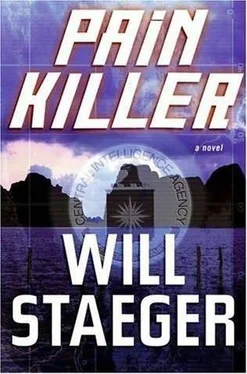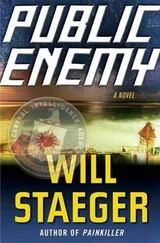Nearby, the USS Scavenger incurred debilitating structural damage and was nearly capsized by the one-two punch of the initial blast concussion and subsequent tidal wave. Beneath the surface of the ocean, the force behind the initial concussive blast was reduced by nearly fifty percent per quarter mile, so that the initial sledgehammer strike of the blast wave had less impact on the Hampton than on the Scavenger-but still, the Hampton’s crew, along with its limited civilian guest roster, got tossed around the sub like confetti in a windstorm.
Some repair work necessitated a delay in the provision of medical attention to the civilians in the Hampton’s SEAL Hole, but once Captain Sampson regained control of the vessel and conditions returned to normal, the civilians were taken to the sick bay and treated by the submarine’s excellent medical staff.
Cooper and Laramie snoozed through the whole ordeal.
Of the fourteen Tridents that were able to clear the Mango Cay vicinity, only missiles 3 and 13 penetrated the NORAD-guided strategic defense weaponry to reach their targets within the borders of the United States. Missile 13 was a replica created by Deng’s team of scientists and turned out to be a dud; failing to release its MIRVs, it crashed uselessly into the tarmac on the longest runway of one of its four intended targets, Ohio’s Wright-Patterson Air Force Base.
Missile 3, an original, delivered fifty percent of its payload. Due to advancing age, poor maintenance, and the physical abuse wrought upon them by the sinking of the USS Chameleon, two of the missile’s MIRVs nose-dived past the altitude-trigger height assigned their warheads and disintegrated on impact well off target near Mount Shasta, in northern California; MIRVs 3 and 4 delivered their warheads between ten and fifteen miles off course, at an elevation of approximately two thousand feet above, though well east, of the additional California-based targets of Edwards Air Force Base and Camp Pendleton.
With this limited list of strikes, Operation Blunt Fist failed to deliver the punishing blow Deng had sought. The planned invasions by the member nations of the so-called revolutionary brotherhood, already on hold following the demise of its leaders, were hastily aborted. The dual thermonuclear explosions nonetheless caused the deaths of 4,784 American citizens, in addition to 673 foreign visitors, within twenty seconds of their detonations. Authorities estimated another three to four thousand casualties would result from extreme radiation exposure outside of the core blast zone.
Once certain intelligence came to light-including photographs retrieved from a severely damaged digital camera strapped to the back of a Caribbean-based CIA operative-the United States implemented a series of military actions referred to by the president as “global peace-keeping efforts.” Amassing significant naval power in the South China Sea to deter China from responding, the American military effected an occupation of Taiwan to ensure the republic’s independence; peace-keeping or defensive occupations followed in Yemen, South Korea, and eight other nations around the globe.
The president used the catastrophe to his advantage in two additional ways: first, in a series of diplomatic summits with China’s newly appointed premier, he gained sweeping free-trade concessions hugely favorable to American corporations; second, his stratospheric popularity ratings discouraged Senator Alan Kircher from seeking the Republican presidential nomination, virtually assuring the president’s re-election.
Laramie was trying to get oriented. She found she was coming awake in a hospital bed someplace where the sun shone through her window. Palm trees swayed and flipped in an easy breeze. An anesthesiologist, and then a surgeon, visited her, each examining her before informing her she was doing just fine. She asked the surgeon where she was, and he told her she’d been brought here to South Miami Hospital by the U.S. Navy. When she asked why they’d brought her to Miami, he told her it was because of his expertise-that the navy relied on him for such things. When she asked what his area of expertise happened to be, he told her he was pretty good at repairing internal damage from bullet wounds, but that she didn’t need to worry, since the bullet they’d been concerned with had failed to exact any long-term toll on its path through her lower back and upper hip.
She asked him whether there had been anyone else the navy had sent to him for treatment, and he told her there hadn’t been, at least not recently. Laramie thanked the surgeon and he left.
She fell asleep the moment he was gone.
The sun was still out, though more orange than yellow, when she woke up again to see a nurse standing in the doorway of her room. The nurse apologized for the intrusion, but informed her there was a visitor who had been waiting in the lobby for some time, and was quite insistent on seeing her. When Laramie asked who it was, the nurse told her that the man had identified himself as Jacob Bartleby.
Laramie tried to shrug but found this to be unexpectedly challenging and discovered they’d put a splint on her right arm. It kept the arm pinned against her body.
“I don’t know anyone by that name,” she said, “but I suppose you can send him in.”
A moment later, a short man wearing a navy blue business suit entered through the doorway, smiled curtly, and said, “Thank you for seeing me. I understand you’re recovering from surgery, and so, will be brief.”
“Thank you.” Laramie felt vaguely woozy.
The man set a briefcase on the table beside the bed, opened it, withdrew a manila folder, and shut the briefcase.
“Please allow me to introduce myself-as the song goes,” he said and smiled at his own joke. Laramie nodded dutifully.
“I represent a real estate investment firm incorporated in the Cayman Islands,” he said. “From time to time my clients make strategic investments in exotic resort properties and related recreational assets.”
“Recreational assets?”
“Deep-sea charter vessels, SCUBA training schools, tropical-”
“How can I help you? Excuse me, but I’m very tired.”
“Of course.” He withdrew a notarized sheet of paper from the manila folder and turned it around so Laramie could see it.
“As I understand it,” Bartleby said, “this is the deed to your condominium property in Falls Church, Virginia. I’ll leave this on the table for you, or would be happy to arrange storage in a safe-deposit box at the bank of your choosing.”
“Deed-what day is it?” Laramie attempted to sit up and look around for a wall calendar but found she could neither sit up nor find a calendar, so she gave up and said, “The payment couldn’t be that late, could it?”
“You’re not late at all. Allow me to explain: my clients have paid off your mortgage.”
“Excuse me?”
“My clients understand you to have been suspended without pay by your employer. And while my clients believe it unlikely the suspension will hold once the independent counsel submits its report on the matter to which your suspension relates, they have nonetheless arranged for your utilities, auto loan, health insurance, and gym membership to be paid in full for a two-year period beginning on the date of your discharge from the hospital. The U.S. Navy is apparently somewhat more appreciative of your recent activities than your employer, as they are footing the bill of your current hospital stay.”
Bartleby withdrew a second sheet of paper to which a small blue rectangular slip had been stapled. Laramie watched, wondering whether the odd words coming from this man’s lips meant that she was still asleep.
“My clients are periodically in need of research consultants-a scout, I believe they call the role-and a source has identified you as a candidate for one of these positions.” He turned the sheet of paper around, and Laramie could see that the smaller slip of paper was a check. “This is an independent consulting agreement which you would need to sign, or can execute by deposit of the attached cashier’s check. The mortgage payoff and utilities advances are in no way contingent upon execution of this agreement. Incidentally, the check is made out in the sum of one hundred thirty-one thousand dollars.”
Читать дальше












